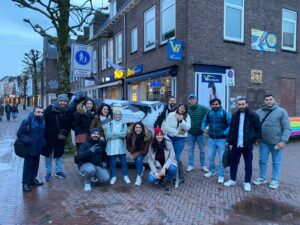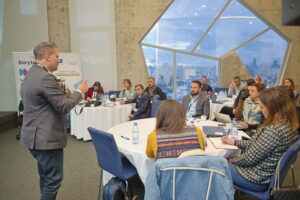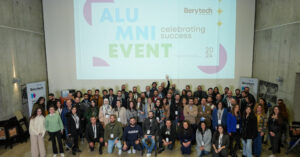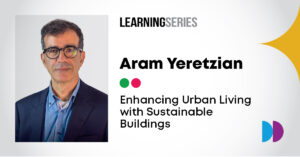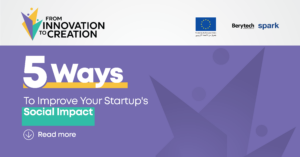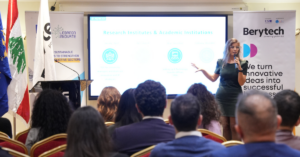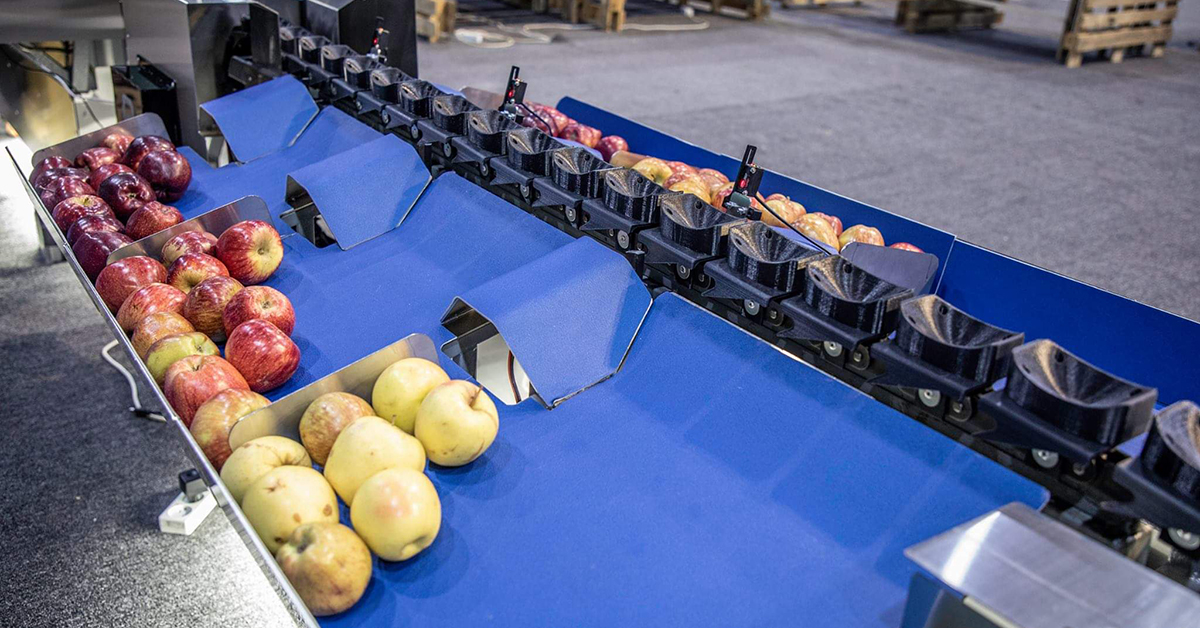 The team from startup Quadra Machinery recently launched a new and improved website that offers agricultural solutions covering pain points in agriculture from pre to post-harvest. The startup, whose core business is smart sorting, is a graduate of Berytech’s Agrytech Agri-Food Innovation Accelerator Program. They enrolled in the program at the time with the prototype of an innovative apple sorting machine. We catch up with co-founder Serge el Khoury to talk about the journey of Quadra and its 3 founders from a basic university project, to a cross-sector solutions provider.
The team from startup Quadra Machinery recently launched a new and improved website that offers agricultural solutions covering pain points in agriculture from pre to post-harvest. The startup, whose core business is smart sorting, is a graduate of Berytech’s Agrytech Agri-Food Innovation Accelerator Program. They enrolled in the program at the time with the prototype of an innovative apple sorting machine. We catch up with co-founder Serge el Khoury to talk about the journey of Quadra and its 3 founders from a basic university project, to a cross-sector solutions provider.
Quadra started with a group of engineers who were motivated by the apple crisis a few years back, where the country’s entire apple crop was left unsold. While still in university, they created a sorting machine that could simplify the mission of improving the quality of apples designated for export. The ambitious project won several awards before the team registered their company and immersed themselves in providing turn-key solutions in agriculture.
Joining the Agrytech Accelerator
Christina Farah, Kevin Boutros, and Serge el Khoury were part of a multi-major team who worked all their university projects together, including their final project. “Because our university did not offer projects for engineers of different disciplines, we came up with an idea of our own in response to the imminent apple crisis back then, a smart machine that simplifies the apple sorting process for the farmer, improving his output for potential export. When our project won a competition in LAU, we decided to participate in the Agri-food Tech Challenge, a competition launched by Berytech and National Instruments,” explains Serge. The team won first place receiving immediate access to the first phase of the Agrytech Accelerator Program where they had to validate their idea to move forward in the program and receive additional cash grants and business support.
“In the Agrytech Accelerator, we got the training, business advice, and technical support from Berytech that we needed to be able to create a successful prototype. We still laugh when we see pictures of our very first prototype made out of cardboard boxes. When we present our startup, we always show how we evolved from that to a wooden version that we created in the Berytech Fab Lab, to eventually our final steel prototype.”
The sorting technology that Quadra innovated is based on machine vision. They use an optical camera to take several pictures of the fruit as it goes through the belt of the machine. As the fruit turns, the camera takes pictures of it on all sides. The software they developed analyses the images to tell the size of the fruit, the color, and whether it has any defects. The team went one step further to include an infrared camera that can show if the fruit has internal defects.
“By the time we graduated from the Agrytech Accelerator Program in June 2019, we had already produced the steel prototype which was capable of sorting by size and color. During the program, we got the help we needed to manufacture the prototype and have a proof of concept. We had a deadline to showcase our prototype during the Agrifood Innovation Day organized by Berytech and this pushed us further.”
Serge confirms that the value his team received from Berytech was from the network they were able to create, not only with the mentors and experts but with professionals and innovators in the other startup teams enrolled in the program. “We benefited from the capacities of other entrepreneurs in the Accelerator who helped us develop artificial intelligence in our software while they were working on their own.”
Software to Hardware
While being accelerated, the startup was extremely focused on developing the software. Once that was perfected, the team shifted their focus to develop the complete hardware of the machine that incorporates, besides the sorting line, a washing unit, a drying unit and a waxing unit.
“To create a machine from scratch, you need to have some expertise in machinery. This is where we found ourselves as engineers with little experience. We decided to grow our team to develop the engineering layout of the machine. We sought out the help of our university professor Dr. Ali Ammouri who, with his brother Mustapha Ammouri, employed their expertise and worked with us as project managers while we developed the design of the machine from scratch.”
Once the machine was designed, the Quadra team faced a big challenge in understanding and protecting their intellectual property. “We had little knowledge of what was considered a patent and what was considered engineering common sense. We conducted a research study with a US expert who broke down the software and hardware components of the sorting machine to evaluate what is patentable.”
Winning the Maroun N. Chammas Recognition Award
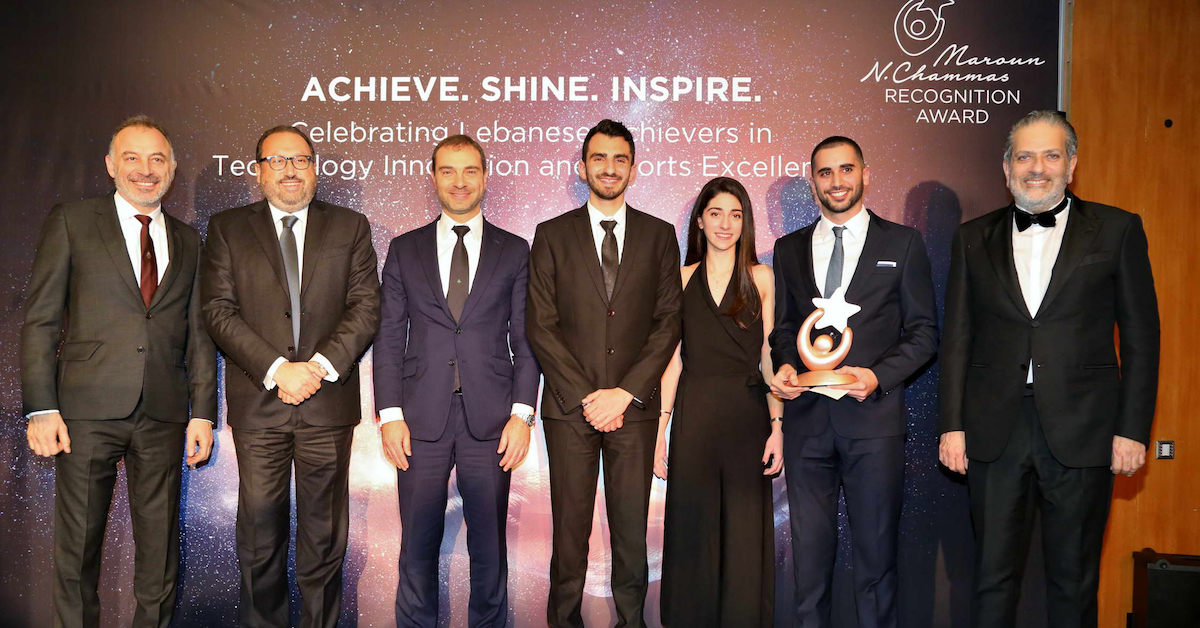
“Participating in competitions defies us to rethink what we have and rework it to live up to the challenge that each competition has to offer. Participating in the Maroun N. Chammas Recognition Award Competition pushed us to revise our idea. Our first plan when we entered the Agrytech Program, was to manufacture the camera box of the machine only. Eventually, we thought of manufacturing the entire machine. Winning the MNC Award allowed our startup to take the leap that it needed.
Not only did it give us enough grant money to start our company and expand our team [US$50,000], but through our frequent mentoring sessions, Mr. Chammas pushed us to focus on our core value.”
“Kevin, Christina and Serge are three amazing people who won the MNC award in 2019. They are motivated and work with passion. They needed guidance and support especially on the ABCs of starting a business. Part of the award, we set frequent mentoring sessions to answer the hundreds of questions they had to ask on setting up and on the administrative and operational aspect. I’m happy to say that I was able to give them some guidance and prepare them to launch,” Maroun Chammas, Founder of the Maroun N. Chammas Award and mentor to the Quadra team.
With the input of the IP research and following the advice of their mentor, the team who was working on both the hardware and software throughout their development phase decided to shift their focus to designing the machine’s greatest asset, which is the camera box, and pour their innovative thinking into perfecting the software.
The team went on to win the MIT Arab Startup Competition and participate in several international exhibitions through which they connected with a large network of solution providers and manufacturers. Forming partnerships with international manufacturers meant they could outsource machine manufacturing to these hardware experts.
Innovating in Times of Crisis
As the country’s economic stability quickly deteriorated at the beginning of 2020, followed by the months-long lockdown, the innovative team quickly re-strategized. “Our first deal with a local client fell through, and our plans to manufacture our first model in Turkey have been suspended indefinitely. We quickly shifted our focus from engineering to marketing.”
The team tapped into the list of its international connections, building on the resources they had established during their visits to exhibitions and mutual exchanges. They created a list of solutions complementary to what they offer and contacted their suppliers for representation in Lebanon and the Middle East.
The newly revamped website now offers solutions from BELCA – a leading Spanish manufacturer of flow pack machines and film-based products, DAUMAR – a Spanish corporation with over 60 years of experience in bagging machinery, DECCO – a world-class Italian organization with over 90 years of expertise in pre- and post-harvest products like fertilizers, sanitizers, cleaners, waxing agents, and more, and most recently, Allround – a Dutch company specialized in manufacturing vegetable processing machines and storage solutions.
“Today our focus is online, our website is now a destination for agricultural solutions. We had aimed to become providers for across the board agriculture solutions within three to five years, but that goal was accelerated because of the turnaround from the situation.”
Facing the Challenges
The team has shown that it is not one to shy away from challenges, after all the whole idea of their startup began with the challenge faced by the apple producers in Lebanon. While the country has not failed to present them with a constant stream of new difficulties, Serge remains positive, “For anyone who wants to enter the startup world, the country presents you with a lot of opportunities to innovate.” Despite all the hurdles thrown at him at the beginning of his entrepreneurial journey, Serge remains hopeful and resilient in his status as an entrepreneur.
There are many disadvantages of being an entrepreneur in Lebanon. You risk a lot, and you don’t know if it will work out. The advantages in my opinion outweigh the downfalls. I graduated in mechanical engineering and I didn’t look for a job outside my field. Today, I’m doing something that I’m proud of, something that I love.
I have tapped into international resources to offer solutions to my community. I love this country and I decided to stay and work on building solutions rather than run away from all the problems.”


